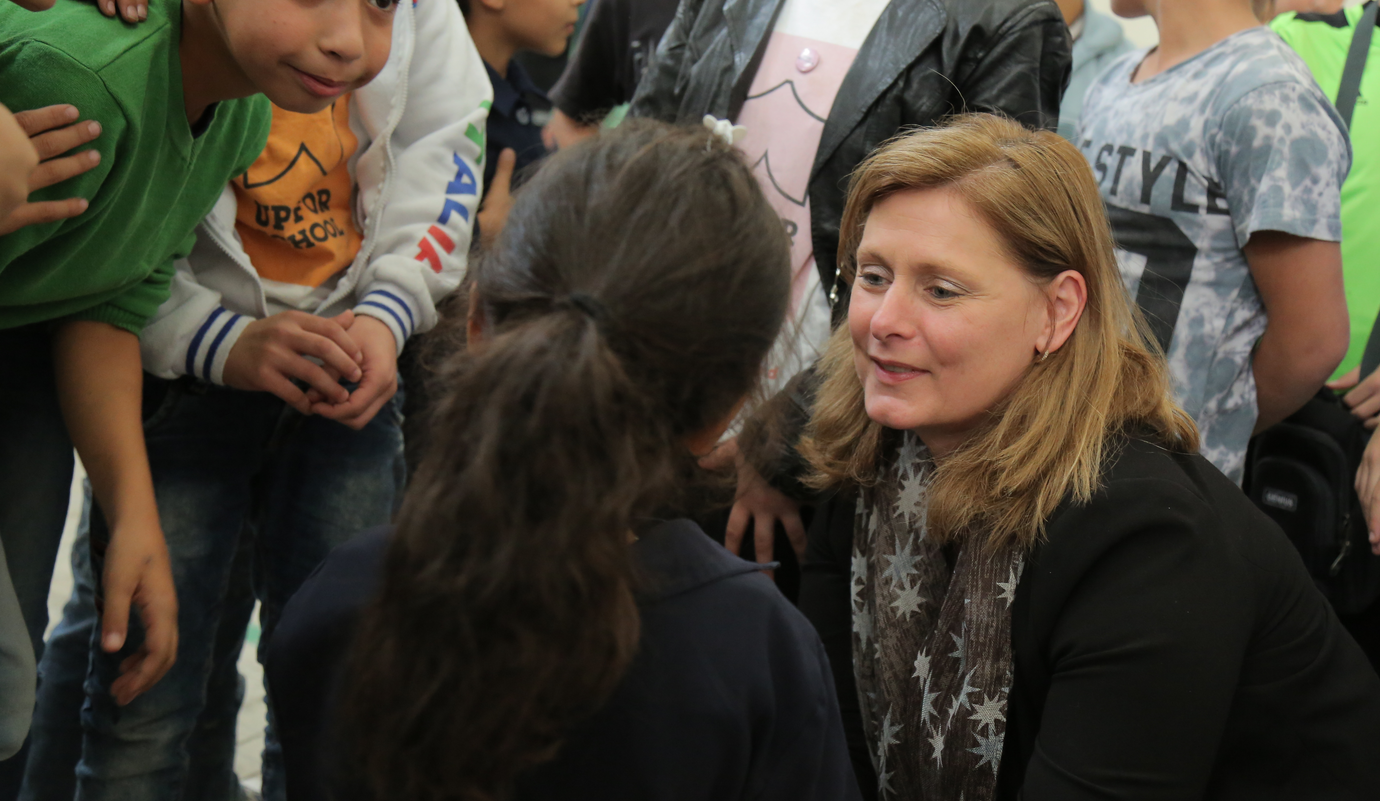
Every child can get quality schooling if we work together says Education Commission chief
Education funding
A Nepalese girl goes to school after the 2015 earthquake Picture: A World at School/Claire Wilkinson
Delivering a quality education to every child in the world is an enormous challenge. It will take many years and billion of dollars.
But it can be done if everyone – from governments and aid agencies to teaching unions, civil society and businesses – works together.
That was the key message from Norwegian Prime Minister Erna Solberg as the global Education Commission on education funding met for its final round of talks in Oslo today. It will deliver a series of recommendations to the United Nations in September.
What is the Education Commission and who sits on it?
Ms Solberg, co-convener of the group that features more than 20 current and former world leaders, said: “Our common task is to provide and protect quality education for the 124 million children and adolescents who remain out of school and to ensure improved learning outcomes for those who are in school.
“According to the UN, an estimated 125 million children are not learning basic skills even though they have spent at least four years in school.”
Commissioners convene for final @educommission meeting in Oslo to determine recommendations for @UN General Assembly pic.twitter.com/iJVhR1VCGY
— Education Commission (@educommission) July 4, 2016
Ms Solberg, writing in The Guardian ahead of the commission’s meeting, said lack of funding is a major barrier to achieving the education target in the Sustainable Development Goals for 2030 – to “ensure inclusive and equitable quality education and promote lifelong learning opportunities for all”.
She said the annual gap between available domestic resources and the total needed to reach the new education targets has been projected to average $39 billion between 2015 and 2030.
She added: “Reaching all children and young people with quality education may be a daunting challenge but we can make significant progress if decision-makers step up to the plate, together with teacher unions, international organisations, the private sector, civil society and others.”
UN Secretary-General Ban Ki-moon has agreed to act on the report from the commission, whose full title is the International Commission on Financing Global Education Opportunity.
He has said: “I look to the commission to provide a roadmap, based on innovative, sustainable and practical solutions, to overcome the barriers to lifelong education and learning for all.”
Gordon Brown and Erna Solberg at today’s media conference
The commission is chaired by Gordon Brown, the former British prime minister and UN Special Envoy for Global Education.
At a media conference before today’s meeting, he said girls’ right to education is high on the list of priorities. He said there is still a long way to go before every girl and boy is in school – but the work of the commission is an important step.
Ahead of today’s events, Mr Brown said the number of children out of school around the world is “a reminder of both the scale of the challenge and what is at stake”.
The 124 million out-of-school children includes 60 million of primary age who are deprived of an education due to conflicts and disasters.
Mr Brown added: “The Syrian civil war alone has disrupted the education of some six million adolescents, half a million of whom are deprived of a higher education. None of this is to speak of the millions of children in school who receive an education inadequate for this century’s challenges.
Turkish students and Syrian refugees are educated together at Istoc Primary School which was visited recently by the children’s charity Theirworld
“We are developing a new approach to finance that will ensure every child – irrespective of location, race or wealth – is guaranteed a free education and that if that child works hard enough the runway to their future is limitless.”
The commission’s recommendations to the UN will be crucial in identifying how much needs to be spent to achieve the education target of the Sustainable Development Goals.
But it will also give guidelines on how that can be achieved.
Theirworld – the children’s charity behind A World at School – believes the commission’s final recommendations should include:
- The protection of education as a right – meaning that pre-primary, primary and second schooling should be free and of a good quality
- Delivery of a package of early childhood development including nutrition, care, stimulation and child health – ECD prepares children for schooling and beyond
- Targeted funding where the need is greatest, including children with disabilities and other marginalised children
- The development and publication of data on enrollment, attendance and completion statistics should be prioritised
- Increased coordination among country and international donor governments and multilateral donors to ensure long-term financing
Education Commission member Jakaya Kikwete of Tanzania
Jakaya Kikwere, commission member and former president of Tanzania, said his country had more doubled the number of children in primary school – and enrollment is now at 96%.
In an article for Project Syndicate today, he wrote: “When a government commits to improving education, it is betting that equipping its citizens for an unknowable future will yield broad-based, society-wide progress.
“This is good not only for the country itself, but also for its neighbours, for which a more stable and prosperous neighborhood can only be beneficial.
“In fact, given the interconnectedness of today’s global economy, better education in one country can bring benefits far beyond regional borders.”
More news

